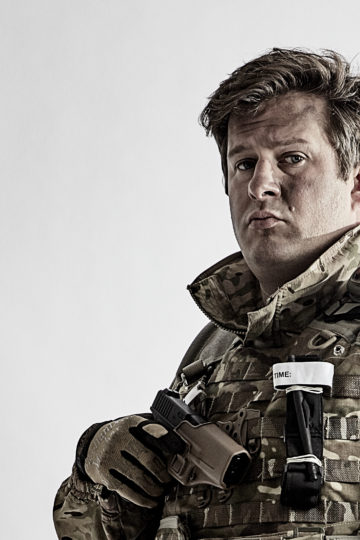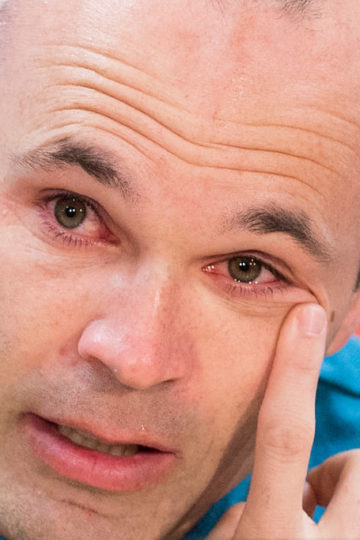“Men slide into my DMs to tell me about their massive …feelings.”
Emotion
Anouszka Tate from the Project Pleasure podcast writes about the men who contact her for emotional support - and it's almost as many as those who send her dick pics.
I’m a woman on the internet, which is of course code for ‘men of the world, please penetrate the walls of my inbox with grainy photos of your appendages’. Why else would I be here if not to coo over your cocks? Well actually, as it turns out, I’m here to provide a caring ear and shoulder to cry on too.
I’m the co-presenter and producer of award-winning sex education podcast Project Pleasure. I talk about sex, bodies, and mental health for a living. Unsurprisingly, my social media presence occasionally invites delightful men to take my sex-positivity as a go-ahead to slide into my DMs with a detailed proposal of what they’d like to do with me. However, I’m more commonly overwhelmed by the number of men who write me unsolicited essays about their emotions.
My Instagram inbox is full of men confiding in me about issues they wouldn’t dream of communicating to their intimate partners because they feel they have a macho image to uphold in the bedroom. They type long lists of questions they’re too afraid to ask mates for fear of ridicule. My corner of the digital world is the only place they can admit to struggling with their mental health.
Despite relentlessly being told by society that real men don’t emote or communicate, they clearly want to. What feminism has done for women is to create collective spaces to share and support one another; why don’t these spaces exist for men? How have we got to a point where you’re having to slide into a random woman’s DMs in order to find a compassionate space to talk?
“It probably has something to do with how dominant and pervasive gender binaries are in our culture,” suggested one particularly astute chap who I quizzed, “Gender roles are tightly defined, so anything considered ‘not masculine’ is instantly considered ‘feminine’, which I suspect frightens men and dulls their desire to explore anything outside the typical male role. Society says that talking about feelings and love is a feminine quality, and therein lies the problem.”
I agree that framing masculinity as the holy grail and femininity as its direct opposite is the root cause of many of our problems. We need to stop gendering human character traits. Why can’t we all aspire to generosity or curiosity or empathy rather than femininity or masculinity? All these sweeping gendered terms do is negatively homogenise everyone, which at best leaves no room for wonderful nuance in personality, and at worst leaves men feeling dangerously repressed.
This indoctrination of characteristics we’re expected to have begins from the moment we’re born. Sure, an increasing number of young girls are now being encouraged to play with traditionally masculine toys, and are emboldened to play sports and become CEOs, but we’re still averse to seeing our boys pushing prams, playing teachers, or brushing Barbie’s hair. This might seem insignificant, but Chris Hemmings, author of Be A Man, is quick to point out that conventional girls’ games enhance social and language skills: “Young girls develop a much keener ability to communicate than boys. Now think about the fact that men’s inability to talk about their problems is one of the major factors contributing to male suicides – the biggest killer of men under 45.”
From a very young age the concepts of caring for and communicating with each other have already been framed as feminine traits, and therefore to be avoided at all costs. “As each stage of their development passes with the guidance of caring women, boys will naturally begin to assume those behaviours just aren’t expected of them,” Hemmings elaborates.
“None of my male friends know about my mental health issues,” one of my followers admits. “There’s no way I’d tell them. I’d be mercilessly ribbed and told to stop being such a girl. Once I missed a rugby game with the lads because I was having a panic attack, but the next day I told them I’d had to go into work last minute.” Anecdotal evidence that we value an impressive overachiever more than a man unashamed of his emotions.
I’m heartbroken when another guy tells me that, “At 30, if I try to share anything about my depression I’m told to stop being dramatic.” I’m getting the impression that it’s fear of other people’s opinions that’s playing a big part in maintaining the status quo. Even those who are open to being open are slapped in the face by the reality that we’ve all been socialised to expect stoicism from men. Perhaps that’s what’s leading men to talk to me in private rather than with people they know in real life – I’m a stranger behind a screen. I won’t judge.

I wonder if my own gender doesn’t have something to do with it too. “I’m a lot happier to talk freely about these things [sex, wellbeing, mental health] with women,” one man concedes, “I find women tend to judge far less than men do. I imagine toxic masculinity has left men with that.”
What I find particularly fascinating is that – as my male messengers have already proved – most men are entirely aware of the gender binaries that stifle them. Given the chance they’re beautifully articulate about their feelings and frustrations. So, I suppose the question I need to ask here is why, despite this knowledge, do men nonetheless continue to uphold gender norms and expect certain behaviours of each other? Is traditional masculinity still seen as so important that it’s worth being complicit in your own misery?
Dr Alicia Walker certainly thinks so. Last year Walker, an assistant professor of sociology and anthropology, began a scientific study looking into whether there’s a connection between perceived penis size and self-esteem. It was quickly called off as a result of both mickey-taking men flooding her inbox with nudes as well as an onslaught of emails from angry trolls. “It was as though I had broken this incredible taboo to even speak into the air ‘hey, men may have negative feelings about themselves because of their penis size’,” Walker explains, “That’s how sacred masculinity is.”
“I’m talking to men who have considered suicide because of their penis size, men who haven’t been to a doctor in a decade because they don’t want to undress …but I was being vilified for wanting to talk about those things.” Walker’s experience highlights just how strong a grip masculine ideals can have on an individual man’s sense of identity; even when others are trying to help him, care for him, nurture him, it feels like a personal attack. It perhaps feels safer to outwardly maintain those ideals and demand them of others too, rather than face freefalling in to an uncertain future.
However, I do think the tide is turning. TENGA, a male sexual wellness brand, recently conducted a global self-pleasure report. They found that 29% of boomer men, 33% of generation X, and 47% of millennial men have felt pressured to ‘man up’, ‘be a real man’, or ‘act manly’. It’s interesting that the youngest men are the ones who feel that pressure most. Does it now feel more like a negative pressure because the classic cookie cutter man – he who is physically strong and comfortable with aggression – isn’t someone they actually aspire to be?
What we now have is a population of men caught between accustomed expectations and more emotional aspirations, but we can’t just whip the old masculinity rug out from beneath men’s feet without actively providing something to replace it. “After four years with my girlfriend I’m now single again and largely enjoying it, but there are pressures put on men long before the bedroom,” a follower writes to me, “It’s difficult to find the balance between flirting, being charming, and seeming like the appealing masculine figure that I/society still broadly think women like, whilst not being too pushy …or maybe worst of all to many men, not sexually attractive at all.”
Through my online interactions I’ve learnt that men are conflicted about who they want to be, who they think the world wants them to be, and how to marry the two. Within classrooms, families, friendship groups, and offices, we need to positively reinforce the qualities we all want to have and cherish in others. You, lovely men, need to decide amongst yourselves what you want masculinity to look like, because until you feel comfortable that your mates, dads, brothers, and bosses share your values I suspect you’ll continue to struggle opening up to them. I sincerely hope that one day soon I’ll wake up to an empty inbox.
Project Pleasure’s ‘Penises & Masculinity’ episode explores these themes further with Chris Hemmings and Dr Alicia Walker – podcast available on iTunes, Overcast and Soundcloud

Join The Book of Man
Sign up to our daily bulletins to be at the lovely frontline of modern masculinity.
Trending

Join The Book of Man
Sign up to our daily newsletters to join the frontline of the revolution in masculinity.












